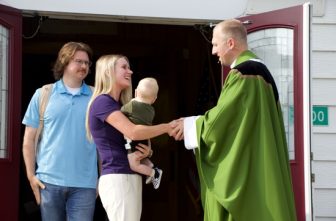
Traditionalist Catholics have urged Pope Leo XIV to ease his predecessor’s restrictions on the Latin Mass, insisting the move was based on misunderstandings and is hampering a Western church revival.
“I hope Pope Leo will put an end to the present persecution of the faithful in the Church — of those who desire to worship God according to the ancient usage of the Roman rite,” said U.S. Cardinal Raymond L. Burke, former prefect of the Vatican’s Supreme Tribunal of the Apostolic Signature.
“I’ve had occasion to express this directly to the Holy Father, and it’s my hope he will, as soon as possible, take up studying this question,” he said.
The cardinal was responding to questions from OSV News during a London conference marking the 60th anniversary of Britain’s Latin Mass Society, or LMS, which forms part of an international network of traditionalist organizations.
He said it should be remembered that sacred worship remained “the highest and most perfect form of Catholic faith,” at a time when respect for the Church’s divine authority had suffered because of “hasty and unwise decisions.”
Meanwhile, another prominent Latin Mass supporter told OSV News areas of the Church that had preserved “the traditional liturgy and faith” were witnessing an upsurge in vocations.
“The Church needs unity, and a capacity to grow in faith and missionary zeal — when traditional means are proving effective, we should make use of them,” said Auxiliary Bishop Athanasius Schneider of the Archdiocese of Maria Santissima in Astana, Kazakhstan.
“If the new pope brings clarity in doctrine and promotes the Mass by example, I’m sure most bishops will follow him,” he said.
The sold-out conference at London’s Oratory church took place four years after a July 2021 apostolic letter from Pope Francis, “Traditionis Custodes,” decreed new restrictions on the Latin Mass.
Joseph Shaw, chairman of LMS and an Oxford University philosophy professor, said he believed “trendsetters in the Church” had erred in assuming they could “make the Church more acceptable” by downplaying its liturgy and symbolism, as well as “the patrimony of Catholic art, literature and thought.”
He added, however, that contemporary culture, though sometimes “cruel, ugly and vapid,” offered “evangelizing opportunities” for the Church if it responded wisely.
Another lay Catholic told OSV News traditionalist worship had effectively been “forced underground” by Pope Francis’ 2021 restrictions, but said many priests had continued celebrating the Latin Mass privately, often via WhatsApp groups, without seeking episcopal permission.
“I’m confident Pope Leo will adopt a gentler approach, allowing traditional practices to grow naturally and restoratively,” said Sarah Ward, a lawyer and LMS representative.
“Plenty of people favor the Latin Mass, while their bishops face problems from Roman interference. Perhaps he’ll give them more leeway, rather than insisting on a centralist approach,” she added.
The traditional Latin or Tridentine Mass, last set out in the Church’s 1962 Missal, was restricted in favor of vernacular translations by St. Paul VI, in line with reforms at the 1962-1965 Second Vatican Council.
It was generally permitted in England and Wales under a 1971 papal dispensation, while permission to celebrate it was extended by St. John Paul II and granted to all priests by Pope Benedict XVI in a 2007 apostolic letter, “Summorum Pontificum.”
In “Traditionis Custodes,” however, Pope Francis ruled that post-Vatican II liturgies were the “unique expression” for Latin-rite Catholics, and said traditional Latin Masses should be allowed by bishops under Vatican supervision only if adherents also accepted modern liturgical reforms.
Several petitions have urged an easing of the 2021 restrictions, including a July 2024 letter by 48 public figures to Britain’s The Times daily, organized by Catholic composer James Macmillan.
In her interview, Ward said interest in the Latin Mass was growing among young people, many of whom had introduced their own parents to it.
“Something akin to a youth movement is already forming via the internet and social media, linking converts from all walks of life,” the Catholic mother of nine told OSV News.
“Many have come to the traditional Mass from atheist backgrounds, unaffected by stereotypes and prejudices. Attempts to suppress this have been a big mistake, and have missed a major opportunity for evangelization.”
LMS’s general manager, Richard Pickett, told OSV News traditionalist Catholics were grateful to bishops who had permitted some Latin Masses to continue, but said he also believed the 2021 restrictions had held back a “potentially major source of renewal.”
Up to 20,000 young people from 30 countries had joined a June 7-9 traditionalist pilgrimage from Paris to the French cathedral city of Chartres, Pickett added, bearing rosaries and chanting in Latin as a mark of support for Church tradition.
“Amid such signs of growth, Pope Leo’s election has galvanized a mood of optimism in many countries,” the society general manager told OSV News.
“Although Francis was concerned to stress the authority of bishops, his decree has, ironically, bound their hands more than ever, and I think many would appreciate being allowed more possibilities,” Pickett added.
Britain’s Catholic weekly, The Tablet, which previously argued against the Latin Mass, said in a June 14 editorial a “revival of Latin” could help drive “liturgical renewal across the global Church in every parish and diocese.”
“Latin has its place as part of the Church’s liturgical heritage,” the weekly said.
“It is time for the Church to reclaim it as its own, and with it a sense of being rooted in classical culture yet spread without boundaries of ethnicity or nationality through time and space.”
Jonathan Luxmoore writes for OSV News from Oxford, England.




